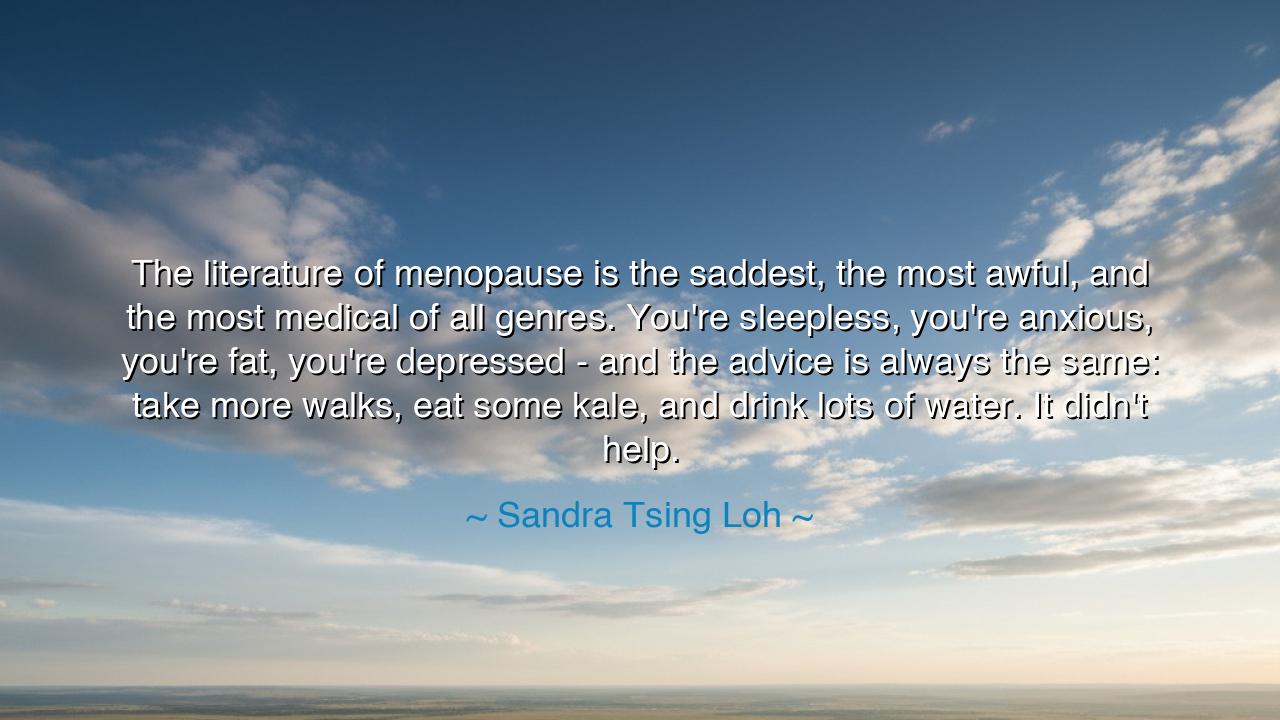
The literature of menopause is the saddest, the most awful, and
The literature of menopause is the saddest, the most awful, and the most medical of all genres. You're sleepless, you're anxious, you're fat, you're depressed - and the advice is always the same: take more walks, eat some kale, and drink lots of water. It didn't help.






“The literature of menopause is the saddest, the most awful, and the most medical of all genres. You're sleepless, you're anxious, you're fat, you're depressed – and the advice is always the same: take more walks, eat some kale, and drink lots of water. It didn’t help.” Thus spoke Sandra Tsing Loh, with the sharpness of wit and the honesty of pain. Her words, at once humorous and mournful, pierce the heart like a truth long ignored — that menopause, that silent transformation of the body, has too often been reduced to a list of symptoms and prescriptions, stripped of its humanity and its depth. Her voice rises not as a complaint, but as a lament — a call for understanding, for dignity, for the recognition that the journey of the body is also the journey of the soul.
From the dawn of womanhood to the twilight of maturity, every phase of a woman’s life has been surrounded by ritual, reverence, and meaning — except this one. In ancient times, the young maiden was celebrated with song, the bride with festival, and the mother with honor. But when the body begins to change once more — when the blood ceases and wisdom ripens — there is silence. No drums, no songs, no sacred fire. Instead, as Loh laments, there are medical pamphlets, sterile advice, and the same hollow refrain: “take a walk, eat better, drink water.” Such words, though well-meant, fail to touch the real ache — the ache of identity, of purpose, of womanhood shifting into something vast and new.
Sandra Tsing Loh, in her sharp yet vulnerable reflection, gives voice to what many endure in silence. Her humor — dry as desert wind — conceals the weight of truth: that modern medicine, for all its power, often forgets the heart. It measures hormones but not sorrow, calories but not courage. It tells women to endure, to self-improve, to “fix” what is not broken, rather than to honor the profound transition that menopause represents. Loh’s words, born of her own struggle, become a mirror for millions, reminding us that what she calls “the most awful of all genres” is not awful because of the body, but because of the neglect surrounding it.
In the ancient world, this neglect would have been unthinkable. Among the wise women of old — the healers, the midwives, the matriarchs — menopause was not a disease, but a coronation. It marked the time when a woman laid aside the burdens of fertility and took up the mantle of wisdom. Among the tribes of Africa, the elder women became counselors and peacekeepers. In ancient China, the cessation of the moon’s cycle was seen as a moment of balance between yin and yang, a restoration of harmony within. But in the modern age, where youth is idolized and aging feared, the elder woman is too often cast aside — unseen, unheard, and told to “eat some kale.” Loh’s despair is the cry of the forgotten priestess, the silenced sage.
Yet even within her lament, there burns a spark — the spark of rebellion, of self-awareness. To declare “it didn’t help” is not defeat, but defiance. Loh refuses to accept that the sum of woman’s wisdom and struggle can be reduced to diet and exercise. Her irony exposes a truth both tragic and liberating: that healing the spirit requires more than medical remedy; it requires meaning. To endure menopause, or any deep transformation, one must first reclaim the sacredness of change — to see the body not as broken, but as evolving toward another kind of strength.
Consider the life of Georgia O’Keeffe, who in her later years turned her gaze away from flowers and bones toward vast skies and deserts. Her art, once sensual and blooming, became elemental — the vision of one who had crossed beyond youth into something eternal. She did not mourn her body’s changes; she painted their echoes. So too can every woman, and indeed every person who faces aging or transformation, find power in that which is fading. For the body may weaken, but the soul ascends, unburdened by the illusions of youth.
Thus, my children, learn from Sandra Tsing Loh’s words, spoken in jest but rooted in truth: do not medicalize your humanity. When you suffer, seek not only medicine, but meaning. When you grow older, grieve not for what is past, but look to what is unfolding. And when the world offers you shallow comfort, remember that wisdom cannot be prescribed — it must be lived.
So, to all who hear this teaching: honor the passages of life — the youth that burns, the motherhood that sacrifices, and the age that teaches. Let not the world’s noise make you ashamed of your transformation. Walk, yes — but walk toward understanding. Eat, yes — but feed your spirit as well as your flesh. Drink, yes — but drink deeply of patience, courage, and wonder. For no phase of life, not even the difficult and sleepless ones, is without purpose. As Loh’s humor reminds us through its pain, there is holiness even in the chaos of the body — and when we learn to respect that, healing finally begins.






AAdministratorAdministrator
Welcome, honored guests. Please leave a comment, we will respond soon